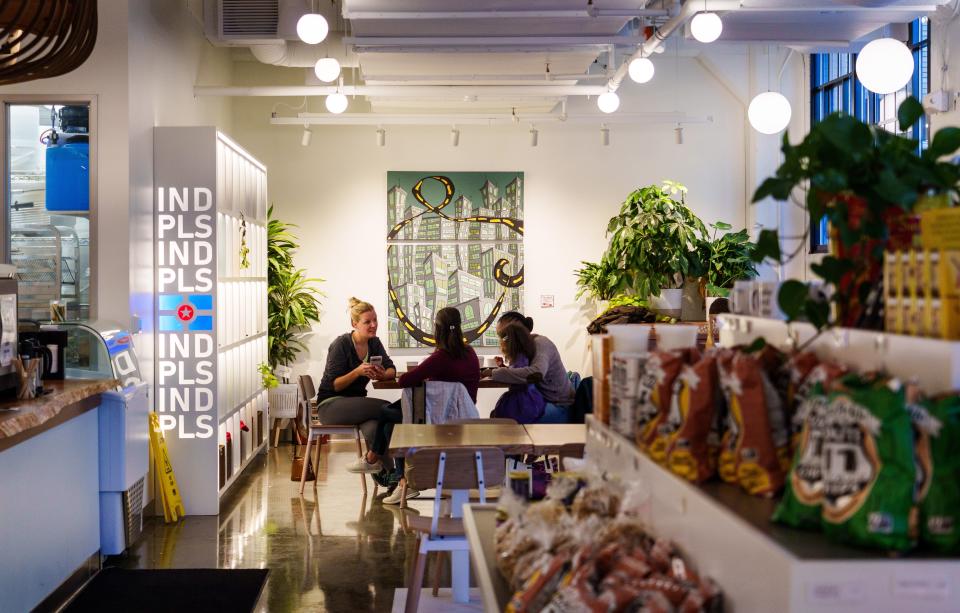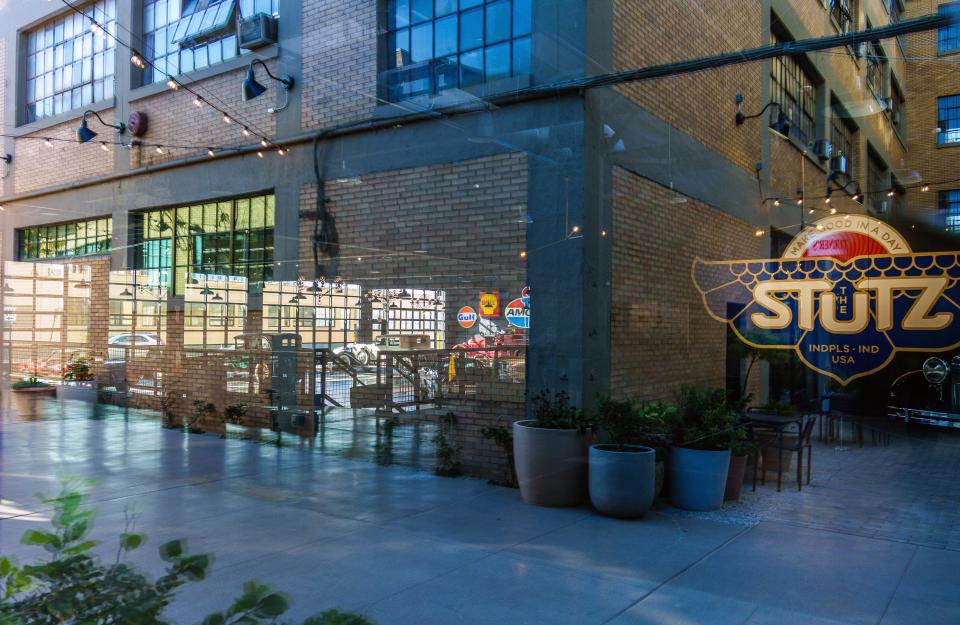From Bottleworks to the Stutz, Indy is seeing the rise of the mixed-use retail campus
For most of its first century, the building that sat in the triangle between College and Mass Avenues served very utilitarian purposes, housing a Coca-Cola plant for decades and then an Indianapolis Public Schools bus depot. In 2017 a developer began repurposing the 12-acre site with the vision of creating a unique entity, one that melded office space, living space, retail and restaurants. The result, the Bottleworks District, has sparked a proliferation of similar "mixed-use campuses," that is, one place that holds offices, shops, restaurants, and sometimes even apartments.
Driving this trend is a mix of factors, experts said. These include a growth in resident population downtown, the post-pandemic demands of consumers wanting convenience in work and leisure routines, and the revitalization of former factory sites in historic, defunct industrial areas.
The Bottleworks District opened in December 2020, with its 139-room boutique hotel inside the historic former Coca-Cola bottling plant's administration building in the 800 block of Mass Ave. The food hall, the Garage, opened weeks later in early 2021.
Since then, numerous projects have been announced that center "mixed-use" as their core concept. The 16 Tech Innovation District close to the Riverside neighborhood has science labs, apartments and a food hall.
The upcoming $1 billion Eleven Park soccer stadium bordered by West Street, Kentucky Avenue and the White River will house more than 600 apartments, 205,000 square feet of office space, nearly 200,000 square feet for retail and restaurants, and more.
Old City Hall is undergoing a $140 million face lift to become a mixed-use complex with apartments and a 21c Museum Hotel and art galley.
The Stutz, which sits in a former automotive factory along North Capital Avenue downtown, has gone through its first $100 million, phase of development with Amelia’s Bread, Café Patachou, event space and a vintage car museum. For three decades, it had been home to dozens of artists' studios.
The New York-based developer SomeraRoad, Inc., is planning offices, retail and apartments for the second phase.
"I think that these projects have done well and are kind of the future of development from a residential, office, and hospitality standpoint," SomeraRoad Vice President Brock Kenyon said. "I think the era of suburban office and downtown high rises is saturated and there will be less of those projects built."
Downtown population growth fuels mixed-use retail campuses
The downtown neighborhoods where these mixed-used campuses are being developed are becoming increasingly popular for young professionals to live, work and play.
Downtown's residential population has risen by 46% since 2010, according to Downtown Indy, Inc.'s 2023 Community Report. Nearly 29,000 people live in downtown Indianapolis, up from over 25,000 in 2021.
With more people comes more needs, especially for food and entertainment.
"The Stutz, you know, is kind of its own little colony there," Edward Battista, co-owner of Amelia's Bread, said. "There's nothing around."

He found that during holiday pop-ups Amelia's held before it officially opened its Stutz location, doctors, nurses and hospital staff from the nearby IU Health hospital came in droves, saying they were sick of eating hospital cafe food, he said.
Since Amelia's opened at the Stutz, he said, the bakery has relied heavily on the downtown working population, as well as drawing residents from the surrounding food deserts.
"There's a whole lot of potential here," he said. "It's been kind of this corner that has been overlooked for a long time."

How the pandemic increased demand for retail campuses
The idea of developers finding a way to attract many consumers to one central retail location isn't new, John Talbott, a retail and business expert at the IU Kelley School of Business, said.
The old model was a shopping mall — with a department store at each end serving as gateways for people entering.
"That model blew up because so many department stores became mediocre or went out of business and other things like that," Talbot said. The new version may look slightly different but the principle is the same.
"I think (the retail campus) kind of marries the growth that you're seeing around Indy," he said. "It is correlated with the overall uplift of Indy in terms of residential, office and other things that the city's been investing in."
Downtown Indy President and CEO Taylor Schaffer said she thinks two reasons lie behind the proliferation of mixed-use development projects.
Post-pandemic people want a higher level of flexibility for live, work and play options, she said. They don't want to sit in traffic. They want to have work, groceries, and lunch options all in one place.
Second, she said, Indianapolis is part of the rust belt and developers, state and city leaders are rethinking the many massive, abandoned factories across the city. The Stutz opened more than a century as ago as a motorcar factory. Eleven Park will sit on land that used to be home to the Diamond Chain Factory, which made roller chains for industrial markets.
"There is this renewed desire to think differently about these oversized footprints as opposed to accepting they've always been industrial and always will be industrial-adjacent," Schaffer said.
Bottleworks sought to fill gap in Indianapolis entertainment
When Wisconsin-based developer, Hendricks Commerical Properties, envisioned how to transform the 12-acre former Coca-Cola Bottling plant five or six years ago, Hendricks' vice president of development Gavin Thomas said, a mixed-use district seemed like an ideal fit for the surrounding neighborhood.
The city did not seem to have one place where people could go to have a place to stay, eat, and be entertained, he added.
"We really wanted Bottleworks to be an entertainment, culinary, mixed-use district that we didn't think Indianapolis really had," Thomas said. "It was kind of fragmented.
Businesses looking for office space to lease have been attracted to Bottleworks because of its variety of amenities, Thomas said.
"All these amenities are only steps away from their office," he said. "It's not like you're in an office park, office tower, and you got to walk long distance or drive somewhere else. These are all integrated together."
This article originally appeared on Indianapolis Star: Indianapolis' mixed-use retail campuses from the Stutz to Bottleworks

